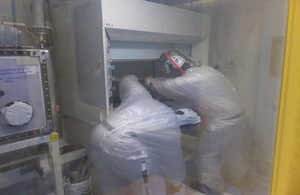When most of us look at pictures from the past, it is style, more than anything else, that identifies the era.
Whether it is frock coats, or flapper dresses, or pink punk hair.
The fashion and beauty industries absolutely define each age.
And today, we need your help to define this one, as the age when the world gets a grip of the climate crisis.
The situation is absolutely critical.
The world has dithered and delayed for far too long.
We are heading for temperature rises of three degrees, with a real risk of higher warming.
The science is very clear, that would mean catastrophe:
Crop failures. More than a million species pushed into extinction. And entire countries lost to the seas.
We simply must change course.
And we know what we are aiming for.
When the countries of the world signed the Paris Agreement in 2015, they committed to limit global temperature rises to two degrees.
And aim to a rise of only 1.5 degrees.
And that it is to avoid the worst effects of climate change.
But because of those years of delay, to keep the 1.5 degree target within reach, we must now halve global emissions over the next ten years.
Of course, this requires action from governments.
And as President of the next UN climate conference, COP26, I am pushing our world leaders to respond with the urgency the crisis demands.
But governments alone cannot sufficiently reduce emissions.
That requires action across the real economy.
We need business, we need investors driving companies, sectors, and the entire global economy towards its clean, green future.
And action from the fashion and beauty industries is a really vital ingredient as well.
Let’s take the fashion industry.
According to Global Fashion Agenda and Mckinsey, worldwide, the industry produced over 2 billion tonnes of greenhouse gas emissions in 2018.
That is 4 percent of total global emissions.
That’s well over the annual emissions of France, Germany and the UK, combined. Put together.
And, demand is on course to grow.
Globally, clothing and footwear consumption is set to rise by 63 percent over the next ten years.
So, I want to be frank: with today’s ways of working, the planet simply cannot take it.
I want to be clear with you friends, this is not a dig at the industry in itself.
As the owner of multiple identical white shirts, I cannot pretend to be a fashion follower.
But I am a strong supporter of business. A very strong supporter.
I was the Business Secretary in the UK government over the past year and, as a team, the UK government worked hard to support businesses through the Covid-19 pandemic.
We supported lives and livelihoods.
I certainly don’t want to curtail your industries. But I do want to see them move to even more sustainable ways of working.
And that, ultimately, is better for your bottom line.
I know that this is a growing movement within the sector, which is great news.
From brands built on more sustainable ways of working.
To innovations to reduce waste and increase the lifetime of garments:
Now, whether that is fashion rental companies and repair services.
Or big brands like Cos selling second hand pieces.
By the way it is a favorite brand of both my daughters’, as well.
All this is fantastic. But, for the sector as a whole, there is much further to go.
Because, on the fashion industry’s own current trajectory, by 2030, its emissions will be almost double the level required to keep the 1.5 degree target within reach.
The sector would miss the 1.5 degree pathway by 50 percent.
So, we need a fundamental shift.
Sustainability cannot be the preserve of certain brands or discreet collections.
Nods to climate action are absolutely not enough.
We need the whole sector to embrace the goals of the Paris Agreement.
And to build clean ways of working into the heart of the fashion and beauty industries.
What does this mean in practice?
Most importantly, it means companies and investors joining the Race to Zero campaign.
This is a United Nations campaign that commits you to reaching net zero emissions by 2050 at the latest.
And, crucially, it requires short-term targets, based on science to take you there.
So that net zero is not just some vague aspiration but a concrete plan.
This is vital to the Paris Agreement.
To keep the 1.5 degree target within reach, we need to reach net zero emissions by the middle of the century.
So it is fantastic that well over 2000 companies have already signed up to Race to Zero.
Including the likes of L’Oreal, Chanel, Artistic Milliners, Unilever, Natura and Co, Stella McCartney, and Ralph Lauren.
You can join through initiatives like the Fashion Industry Charter for Climate Action.
This is the principal route for the fashion industry to join.
Other businesses can sign-up through the “Business for 1.5 degrees” initiative as well.
And investors and financial institutions can join through the Glasgow Finance Alliance for Net Zero.
The UK’s COP2 presidency will celebrate new recruits on social media.
And I urge all companies and investors that have not yet signed up to absolutely do so.
And if you are already on board, lobby others to join you, including through your trade associations.
Signing-up is not only good for the planet.
It is actually very good for business too.
Consumers are increasingly concerned about the environment.
More and more companies are joining the Race to Zero campaign.
The transition to clean ways of working is, unfortunately, moving too slowly, but it is going in the right direction.
And when a critical mass of firms have changed how they work, entire industries will shift.
The default will change, and sustainable ways of working will rapidly become the norm.
And if individual companies do not take action now, they risk being left behind.
Trying to catch up with your competitors sailing ahead, into the clean, green future.
So, please, act now.
Sign up to the Race to Zero campaign.
Move your business towards 100 percent clean energy through the RE100 campaign.
Play your part in pushing fashion towards greater circularity.
UK firms can sign up to the new Textiles 2030 initiative, for example.
And, finally, please clean up your supply chains.
This is vital in both fashion and beauty.
Common cosmetics ingredients like palm oil, can drive deforestation.
While McKinsey and Global Fashion Agenda estimate that 70 percent of fashion’s emissions come from supply chain activities like material production.
So please, work with your suppliers to reduce impacts.
Commit to eliminate deforestation from your supply chains.
And use your purchasing power to drive change across the whole of the global economy.
In short, do what you do. And define this age.
Help to make this the era we get on track to make the goals of the Paris Agreement a reality.
Fashion and beauty have shaped the world.
Now you need to help save it.
And I am counting on you. Indeed, the world is counting on you. Let’s make this happen, together.
Thank you.


